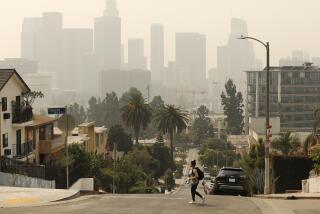Beijing’s ‘red alert’ smog warning closes schools, limits driving
- Share via
Beijing issued its second-ever “red alert” for smog Friday morning, triggering school closures and driving restrictions across the city.
Beijing residents were less than thrilled – many questioned the government’s commitment to fighting air pollution, and the effectiveness of the temporary measures, which include keeping half of the city’s cars off the roads and temporarily shutting some construction factories.
Join the conversation on Facebook >>
Beijing’s Office of Emergency Management announced at 7 a.m. Friday that the measures would last from 7 a.m. Saturday morning until midnight on Tuesday.
“What kind of lazy governance is this!” Kui Gongchen, a former editor at China Youth Daily newspaper, wrote to his Sina Weibo microblog. “Are the traffic restrictions really effective? Aren’t we still waiting for the wind to come to blow away the smog? Mr. Mayor, please give me an answer.”
When local authorities issued this year’s first smog red alert last week, half of the city’s cars were kept off the street for three days. But the city’s air quality index, a widely accepted measure of air pollution, hovered around 300 during that period, 10 times levels recommended as safe by the World Health Organization.
Data collected by Beijing’s Environmental Protection Bureau showed that levels of PM 2.5 -- fine particulate matter considered highly dangerous to human health -- dropped by 14.6% while the red alert was in effect, Wang Siyue, a researcher who specializes in air quality studies at Chinese Academy of Science, told China Central Television.
What kind of lazy governance is this! ... Aren’t we still waiting for the wind to come to blow away the smog?
— Kui Gongchen, a former editor at China Youth Daily
But Wang added that simply relying on temporary measures is not enough to bring clean air to the city.
“The red alert measures, including traffic restrictions, can only help reduce the top air pollution level, bring it down from 500 to 300,” he said. “But ordinary people can’t really feel the difference. The key is still try to control the source where pollutants in the air come from.”
After the city had experienced a long stretch of blue-sky days during major events, such as the Asia Pacific Economic Cooperation meetings in November and a military parade in August, it appeared Chinese authorities had discovered the secrets to keeping smog away from Beijing and other northern Chinese cities. Yet it took a massive effort – they had to shut down thousands of factories in more than seven provinces surrounding Beijing to keep the smog at bay.
Many local residents argued that instead of trying to curb industrial pollution, a major factor in northern China’s air pollution problem, the government has taken an easy route by stopping ordinary people from using their cars.
“Why do I have to pay the price for the government’s failure to solve the smog problem?” Weibo user and entertainment industry employee Ben Wong wrote in a post.
In January 2014, local authorities in Beijing unveiled a plan to spend more than $125 billion to improve the city’s air quality by 2017. State-owned China National Radio ran an op-ed in early December, when air quality in Beijing reached “hazardous” levels, casting suspicions on how the government spent the money.
Coal-burning pollutants were the most important contributor to northern China’s air pollution in early December, according to an analysis published on the Ministry of Environmental Protection’s website.
Despite the growth of coal consumption in China slowing significantly in recent years, coal still accounted for 66% of the country’s annual energy consumption in 2014, official figures show.
China’s coal consumption accounted for 50.3% of the world’s total in 2014, according to figures released by the Institute for Energy Economics and Financial Analysis.
Beijing residents were quick to note the discrepancy between the government’s anti-pollution rhetoric and their smog-choked reality.
“Except for taking advantage of the venerable ordinary people, is the government capable of doing anything else?” said a Weibo post by user Wang Wei.
Another post, by Chen Zhen, an auto show host in Beijing, said simply: “Putting cream on your foot can never help ease your stomach pain.”
Tommy Yang in The Times’ Beijing bureau contributed to this report.
ALSO
Air Force to allow non-officers to fly drones for first time
EU leaders scramble to save a signature achievement: Passport-free travel
San Bernardino shooter was a Pakistani who became known as a ‘Saudi girl’
More to Read
Sign up for Essential California
The most important California stories and recommendations in your inbox every morning.
You may occasionally receive promotional content from the Los Angeles Times.










